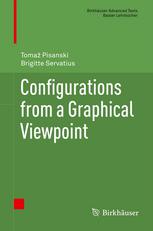

Most ebook files are in PDF format, so you can easily read them using various software such as Foxit Reader or directly on the Google Chrome browser.
Some ebook files are released by publishers in other formats such as .awz, .mobi, .epub, .fb2, etc. You may need to install specific software to read these formats on mobile/PC, such as Calibre.
Please read the tutorial at this link: https://ebookbell.com/faq
We offer FREE conversion to the popular formats you request; however, this may take some time. Therefore, right after payment, please email us, and we will try to provide the service as quickly as possible.
For some exceptional file formats or broken links (if any), please refrain from opening any disputes. Instead, email us first, and we will try to assist within a maximum of 6 hours.
EbookBell Team

4.4
102 reviewsConfigurations can be studied from a graph-theoretical viewpoint via the so-called Levi graphs and lie at the heart of graphs, groups, surfaces, and geometries, all of which are very active areas of mathematical exploration. In this self-contained textbook, algebraic graph theory is used to introduce groups; topological graph theory is used to explore surfaces; and geometric graph theory is implemented to analyze incidence geometries.
After a preview of configurations in Chapter 1, a concise introduction to graph theory is presented in Chapter 2, followed by a geometric introduction to groups in Chapter 3. Maps and surfaces are combinatorially treated in Chapter 4. Chapter 5 introduces the concept of incidence structure through vertex colored graphs, and the combinatorial aspects of classical configurations are studied. Geometric aspects, some historical remarks, references, and applications of classical configurations appear in the last chapter.
With over two hundred illustrations, challenging exercises at the end of each chapter, a comprehensive bibliography, and a set of open problems, Configurations from a Graphical Viewpoint is well suited for a graduate graph theory course, an advanced undergraduate seminar, or a self-contained reference for mathematicians and researchers.